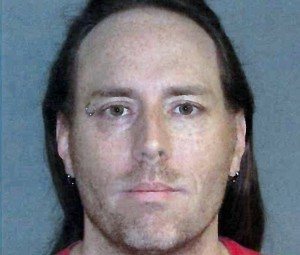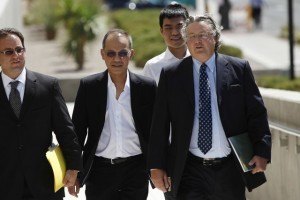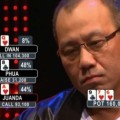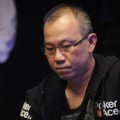
2015 Poker-Related Crimes: Who Got Time and Who Walked Away

Christian Lusardi’s royal flush has landed him in prison for the next five years, the costliest price any crook paid in 2015 poker-related crimes. (Image: NJ.com)
Poker-related crimes in 2015 were seemingly straight out of a Hollywood script, theft abundant and the takes bountiful.
Scandal has a long history with the game of poker dating back to its earliest days when players put cards in the air in the back of Old West taverns instead of glitzy Las Vegas casinos.
The past 12 months were no exception, con artists once again enticed by the allure of the felt.
There were plenty of unlawful headlines to choose from, but these six stories packed drama and turmoil and had a significant impact on gambling.
While they all share the common denominator in being illegal accounts, their individual punishments varied greatly from getting off scot-free to serving several years in prison.
#3 Guilty: Archie Karas
Notorious for enduring the longest and wealthiest gambling winning streak in casino history when he turned $50 into more than $40 million, Archie Karas was added to Nevada’s List of Excluded Persons by the Nevada Gaming Commission in September due to his 2013 arrest for card marking.
Karas has been arrested several times on suspicions of cheating over the last two decades.
The high roller would eventually lose his fortune playing poker, the primary reason he returned to the Strip for one last sting two years ago.
Law enforcement was ready for him, and while he escaped time behind bars, Karas won’t ever be permitted to step foot in a Vegas casino now that his life’s chapter is in the Black Book.
#2 Guilty: Phil Ivey
One of poker’s most talented pros, Phil Ivey was caught edge sorting at Crockfords Casino while playing baccarat.
Ivey won $12.4 million during his run, and while he maintained he wasn’t cheating but using his talents to gain an advantage, an England judge ruled otherwise.
Crockfords never paid Ivey his millions, and the court verdict ruling means it won’t ever have to pay up. “I believe what we did was nothing more than exploit Crockfords failures,” Ivey said. “Clearly the judge did not agree.”
#1 Guilty: Christian Lusardi
The game’s most infamous story in 2015, Christian Lusardi flushed his freedom down the toilet at the Borgata Winter Poker Open in Atlantic City.
During the 2014 tournament, Lusardi played with counterfeit chips and later tried to conceal his wrongdoings by flushing them down the toilet of his Harrah’s Casino room. The chips clogged the plumbing and caused major leaking.
In April, the 43-year-old pled guilty, but not to the chip scandal but for counterfeiting DVDs. He was sentenced to five years in prison and ordered to pay $1,137,864 in restitution.
According to reports, Lusardi agreed with federal prosecutors to admit guilt in bootlegging movies in order to escape charges related to the Borgata incident. However, the severity of the bootlegging sentencing is likely a result of the poker scandal.
#3 Walked Away: Lock Poker
Lock Poker swallowed the key to its padlock in April unbeknownst to players who were making deposits right up to its closure. Not only was there no warning or announcement, the site also ran off with an estimated $10 to $15 million in customer monies.
Adding insult to financial injury, Shane Bridges, a former employee, says CEO Jen Larson continues to live the good life, sipping on $500 bottles of wine, flying first class, and staying in five-star hotels. Due to its headquartering in Curacao, players in the United States have little recourse.
#2 Walked Away: Bryan Micon
Poker’s leading Bitcoin entrepreneur, Bryan Micon’s 2015 was truly eventful. Following a raid on his Nevada home, the former SealsWithClubs chairman uprooted his family to Antigua in order to live in a country that doesn’t have a “police state.”
After authorities charged him with operating an unlicensed interactive gaming system, Micon lawyered-up with Vegas’ go-to law firm, Chesnoff & Schonfeld.
Micon returned to Nevada in June and pled guilty to one misdemeanor in a deal that allowed him to avoid a potential prison term.
The $25,000 fine is certainly a penalty, but Micon’s ability to remain a free man and have the felony reduced to a misdemeanor is definitely a win for the Bitcoin and gaming freedom advocate.

Paul Phua and attorney David Chesnoff made the greatest escape in 2015 poker-related crimes, the Malaysian high-stakes gambler avoiding all charges related to his World Cup illegal betting ring. (Image: Erik Verduzco/Las Vegas Review-Journal)
#1 Walked Away: Paul Phua
If you get in trouble in Sin City and have the funds to afford him, you hire lawyer David Chesnoff. The man’s represented countless celebrities and high rollers, and in 2014 he added Malaysian “businessman” Paul Phua to his resume.
During the World Cup, Phua was caught operating an illegal sports betting ring from his Caesars residence.
The FBI sting was called into question when it was revealed authorities secretly videotaped the premises without a search warrant while posing as Internet repairmen.
Chesnoff argued that the evidence should be inadmissible, a judge ultimately concurring in May that the tactics used by investigators was illegal.
Phua, who’s been linked to the 14K Triad in Hong Kong, escaped all charges in the end and departed Nevada on his $48 million private jet.















0 Comments